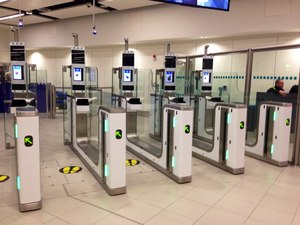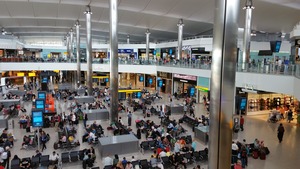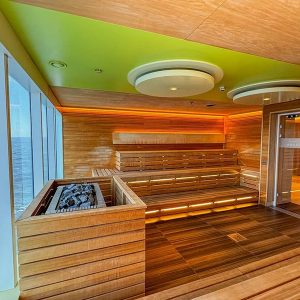A lady newspaper columnist (I cannot write that description without thinking of Private Eye’s ‘Polly Filler’), recently waxed lyrical about our freedom to fly to all points of the compass, but could not resist a dig at airports which, in her words, are: “… a rehearsal for tyranny, testing the limits of human ability to withstand petty bureaucracy and queuing …”.
Airports are usually in the news when something goes wrong, which is understandable because the media generally holds that things going right are not ‘newsworthy’. But I believe their managements come in for a lot of unjustified criticism, because most of the things that go wrong aren’t their fault.
I hold that opinion after a lifetime of travelling by air, and on the basis of a year spent in close contact with the folk who run one of Britain’s busiest airports. I was a member of a working group trying to make things easier for their customers. One of our number was a specialist in the field of disability, another had the needs of young children uppermost in her mind, a third specialised in the demands of business travellers.
It was a fascinating experience, which has returned to mind because of a report in the same national newspaper that employs the abovementioned female columnist. A report about the Border Force failing more than 100 times to meet its waiting time targets in December. That it failed is no surprise, because it is understaffed and underfunded.
On its creation, some years ago, it chose to put its staff into uniform. A bad decision, I believe.
 Previously, the men and women who inspected your passports on departure and, more importantly, on arrival at airports, wore plain clothes. (It was a situation unique to the U.K., rather like the fact that we are the only country in the world which doesn’t put its name on its postage stamps.)
Previously, the men and women who inspected your passports on departure and, more importantly, on arrival at airports, wore plain clothes. (It was a situation unique to the U.K., rather like the fact that we are the only country in the world which doesn’t put its name on its postage stamps.)
Back then, I recall an American lady mentioning this to me as we waited at the luggage carousel. “Those people at passport control are really scary”, she said. “You just don’t know who they are, or what powers they have. Are they MI5 or something?”
Nowadays, in uniforms identical to those at airports throughout the world, you know exactly who they are. Civil servants. Essential civil servants, of course. But civil servants nonetheless.
They work for an organisation that has no incentive to be efficient, other than the fact that people get annoyed when it is not. A perfect example of institutional indifference towards the public, in contrast to the rest of the airport operation – airline check-in desks, shops, restaurants, bars, etc. – where competition ensures a customer-friendly approach. The Border Force has no competition to spur it on.
However, I have an idea which might give the Force the incentive it needs. Bear with me while I explain.
That report about their failure to meet December waiting time targets pointed out that passengers arriving from the European Economic Area should be through Passport Control within 25 minutes, 95% of the time. Passengers from non EEA countries should be through within 45 minutes, again 95% of the time.
Now I appreciate that waiting longer than you should to clear passport control is not to be compared with waiting longer than you should to be seen at the Accident and Emergency department, but if Border Force can be incentivised to improve its performance, it should be.
The answer lies in the Airport Passenger Duty – commonly known as the ‘Departure Tax’ – levied on everyone who flies out of the UK on holiday or business. A tax which is extremely high, and which is to be increased in April. And also on the cost of applying for a Passport which – surprise , surprise – is also going up. But let’s begin with that Departure Tax.
At the moment, people flying economy class to a destination less than 2,000 miles away pay £13 in tax. If the destination is more than 2,000 miles, it is a whopping £75. After April the short-haul £13 will remain the same, with the plus-2,000 mile levy rising to £78. Business and first class passengers pay more, of course, but we don’t need to go into those details here.
Suffice it to say that our tax is considerably higher than departure taxes paid by the citizens of most other countries. And at the moment, we see no benefit from it.
As for the cost of getting a Passport, the present £72.50 for an adult is to rise to £75.40. A child’s Passport, currently £46, will become £49. Those increases are for applications on line. People who apply by post, for the understandable reason that they don’t have access to the internet, will have to pay £85 or £58.50 respectively.
 Justifying the increases, a Government spokesperson said it would provide more money for the operation of the Border Force, which brings me to my cunning plan.
Justifying the increases, a Government spokesperson said it would provide more money for the operation of the Border Force, which brings me to my cunning plan.
It is that, on joining the passport queue on our return from our holiday or business trips, or whatever, we should take from a dispensing machine a ticket whose barcode registers the time.
Once past the control desks, we insert our ticket into a similar machine which can calculate, to the second, how long it has taken us to get there.
If that time exceeds the 25 or 45 minute target, this second machine should dispense an apology and some cash – a part-refund of the unfairly high tax we had to pay when we left the U.K., and the hugely inflated cost of getting a Passport – because we didn’t get the service we were promised.
I have no firm thoughts on what the scale of that compensation should be, but £1 a minute should certainly be an incentive to sharpen up the system.
It won’t happen, of course. It would set a precedent by putting commercial pressure on a service provided by the state. Unthinkable!
So we’ll go on having to put up with delays ‘at peak times’ – which is a euphemism for ‘more often than not’, and lump it.
But even so, it won’t diminish my affection for airports, which is something of a love-hate relationship.
I hate the ridiculous rigmarole of airport security. I also hate the fact that people can drink alcohol at breakfast time (though, hopefully, that may be curbed soon).
But I love the shops selling wildly expensive ‘designer’ sunglasses, or adaptors which cram 76 different electric plugs into something the size of a matchbox (I exaggerate).
And I absolutely adore the fact that you can, if you are so minded, buy a bar of Toblerone the size of a pit prop.
Such monsters are sold only at airports, but in all my years of travelling, I’ve never seen anybody buy one.












